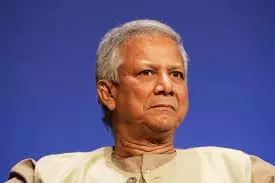
PUNE: Dr Abraham Mathai, former vice chairman of Maharashtra State Minorities Commission, said it was an alarming situation that, even after the Bangladesh High Court rightfully granted bail to a Hindu monk Chinmoy Krishna Das on Wednesday—five long months after his arbitrary detention—the regime in power continues to blatantly defy the judiciary and obstruct justice.
“This open contempt for a constitutional verdict is not just a legal anomaly—it is a deliberate act of authoritarian overreach and religious persecution,” said Dr Mathai, also founder chairman of Mumbai-based Harmony Foundation.
He said what is unfolding in Bangladesh under the current Islamist fundamentalist regime is nothing short of a systematic dismantling of democratic institutions.
The repeated targeting of religious minorities, particularly the Hindu community, represents a calculated assault on human rights and the foundational values of the state, Dr Mathai noted.
This regime has proven itself to be vindictive, intolerant, and fundamentally opposed to pluralism and justice, he pointed out.
In this context, Dr Mathai has also condemned the recent wave of attacks on the Hindu minority in Bangladesh.
“These individuals chose to stay in Bangladesh in 1947 out of faith in the country’s legal system and its people. That decision was rooted in trust, not compulsion. Today, that trust is being cruelly betrayed. It is the duty of the state—irrespective of which party is in power, whether it is the army, police, or interim government—to protect all its citizens, including its minorities. The government cannot afford to turn a blind eye as radical elements exploit political instability to target vulnerable communities.”
Dr Mathai said the persecution of revered monk Chinmoy Krishna Das is not an isolated case. It reflects a larger crisis that includes mob violence, property seizures, and routine intimidation of Hindus, Buddhists, Christians, and other marginalized groups. These are not just human rights violations—they are crimes against the spirit of democracy and the rule of law.
“The protection of minorities is not the burden of civil society; it is the sacred responsibility of the state,” Dr Mathai added.
He urged Muhammad Yunus, now leading the interim government, to act decisively: restore law and order, hold the perpetrators accountable, and ensure that all arms of the government prioritize the safety of minorities.
Dr Mathai also referenced the tragic bravery of Faraaz Hossain, who chose to stand by his Hindu friends during the 2016 terrorist attack at the Holey Artisan Bakery in Dhaka, sacrificing his own life to confront radical extremism. His martyrdom, posthumously honoured with the Mother Teresa Award, symbolizes the human cost of not remaining silent in the face of hatred.
“Therefore, it is imperative that the international community intervene. The regime must be arraigned before the International Court of Justice at The Hague and investigated by the United Nations Human Rights Council. If Bangladesh continues to act with impunity, the world must respond with principled, diplomatic, and legal pressure to restore justice and constitutional governance,” Dr Mathai noted.
The Norwegian Nobel Committee should withdraw the 2006 Nobel Peace Prize awarded to Muhammad Yunus for allegedly colluding with the radical Islamic forces in violating fundamental human rights.
Justice delayed is justice denied but justice defied is a threat to humanity, he said and the time to act was now.






